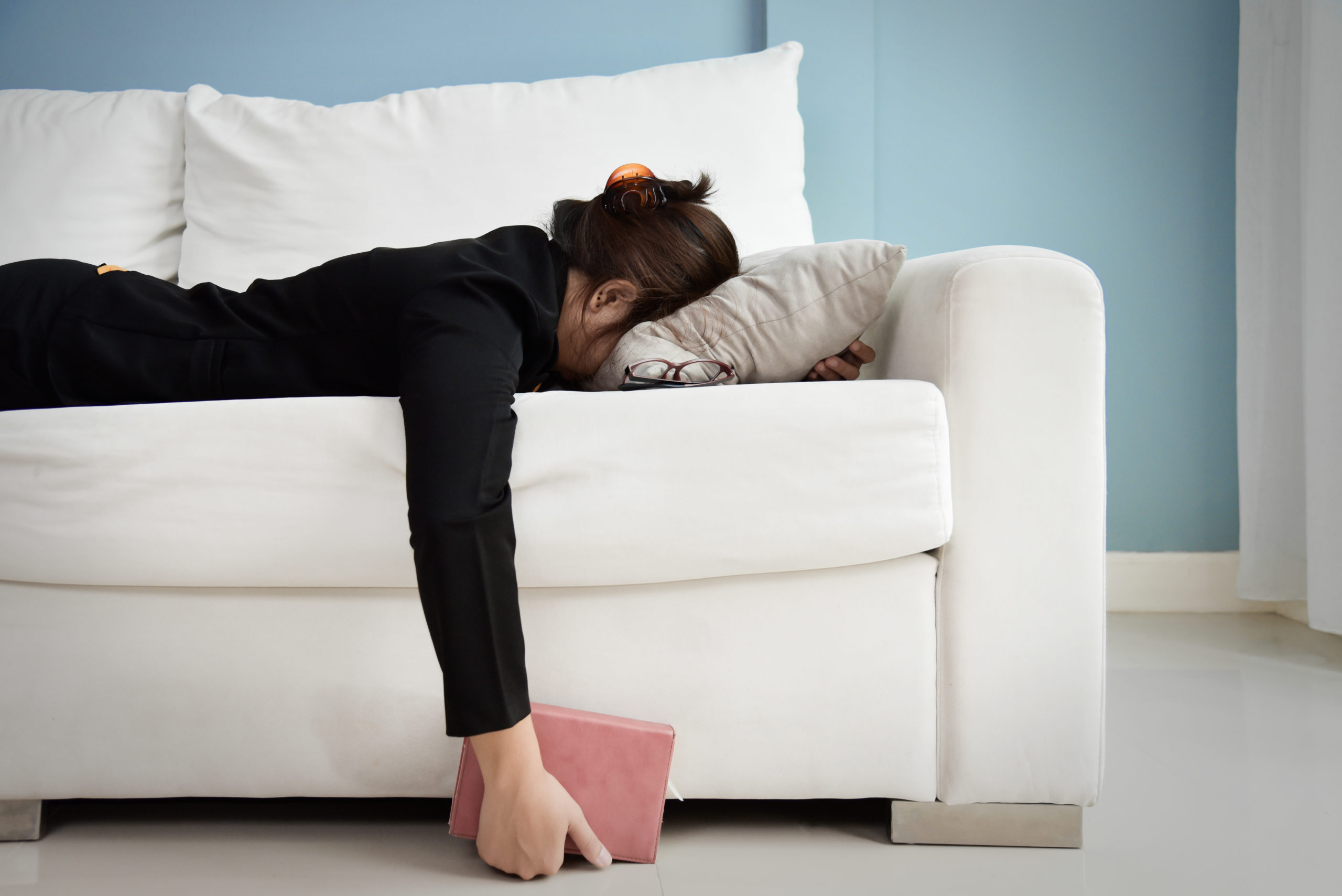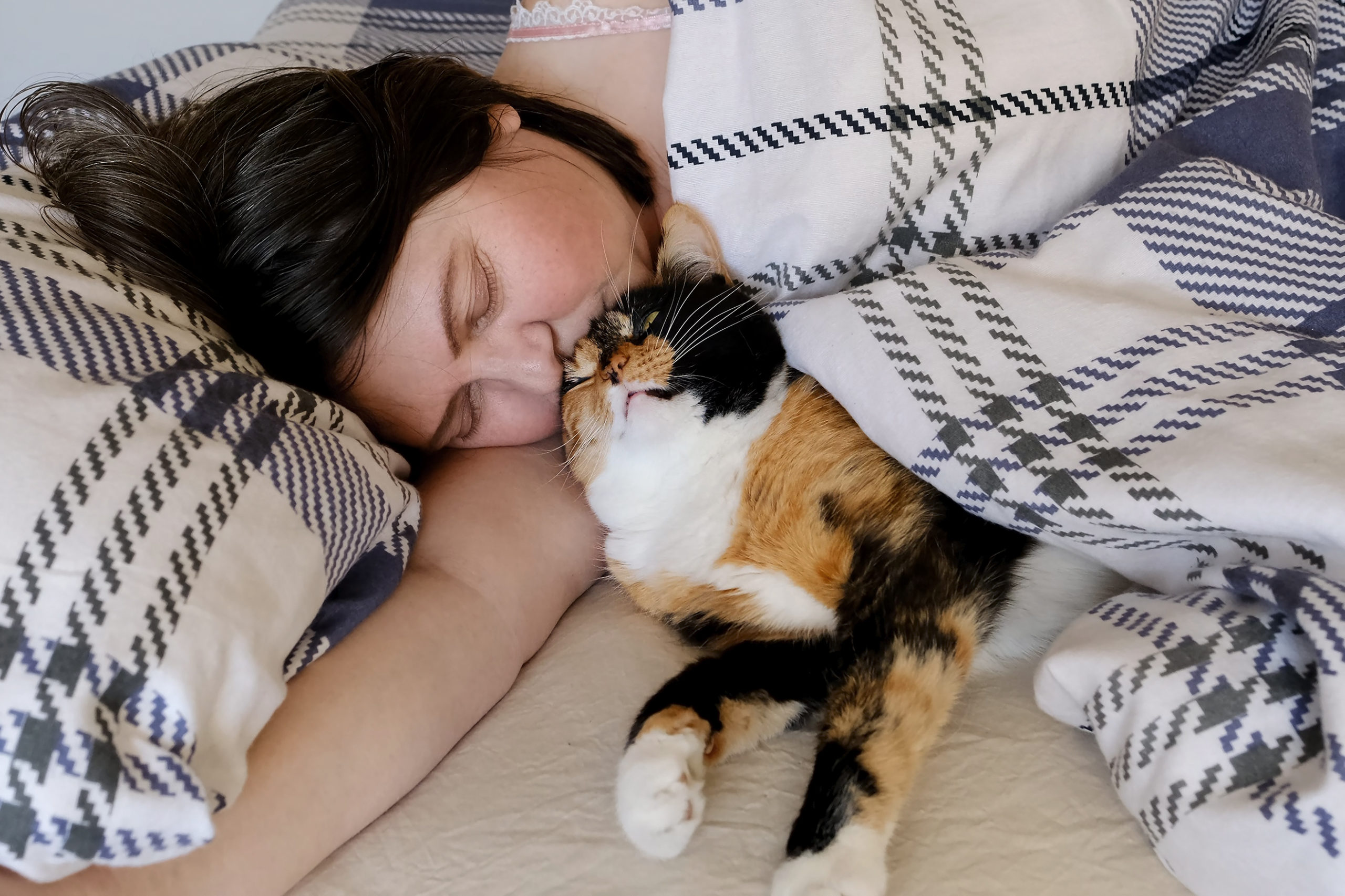What is Fatigue & Tiredness?
The term fatigue is used to describe a general sense of tiredness and lack of energy. Tiredness is a term that is also commonly used to describe fatigue and a lack of energy and alertness.
Fatigue alters your outlook on life, taking away your motivation and often making even simple tasks feel beyond your capabilities. Fatigue should not be confused with being sleepy or tired. Sleepiness can be a symptom of fatigue but sleepiness can be managed with a good night’s sleep, whereas fatigue is not always helped by a good night’s rest.
The variation in your hormone levels that happens during the menopausal transition can also cause fatigue, often as a side effect from other common perimenopausal symptoms such as insomnia, hot flashes, and night sweats that can leave you poorly rested. Fatigue is closely associated with depression and anxiety, both of which are also common symptoms of the menopausal transition. [1] [2] [3]
The causes of fatigue can be grouped into three categories:
- physical health conditions (including the menopausal transition);
- mental health conditions (again, possibly a result of the menopausal transition); and
- lifestyle factors.

Physical health conditions that result in fatigue, including anemia, arthritis, sleep disorders, autoimmune disorders, fibromyalgia, and diabetes. Mental health conditions that result in fatigue include anxiety, depression, and seasonal affective disorder. Lifestyle factors include a lack of physical activity, obesity, stress, boredom, alcohol use, inadequate nutrition, and lack of sleep. [2]
Fatigue is a common symptom of the menopausal transition. One study that looked at the experiences of 300 women found that fatigue affected 19.7% of women not yet in perimenopause, 46.5% of women in perimenopause, and 85.3% of women in postmenopause. [4]
Self-care & Natural Remedies for Fatigue & Sluggishness
Finding a way to improve and manage your fatigue can be difficult because it is such a common symptom for many different conditions, but it is possible. As with other menopausal transition symptoms, figuring out what will work to help you is a process of elimination.
Consider trying some of the following suggestions to see if there is any change in your fatigue:

Manage your hot flashes and night sweats as best you can. Visit our section on Hot Flashes and Night Sweats to get detailed information about how to help reduce the impact of these as your interrupted sleep may be a major factor in your fatigue.
- Yes, it can be hard to get motivated to get out of bed when you have fatigue, but research shows that moderate- to high-intensity exercise is associated with higher energy levels in post-menopausal women. [5] A different study found that regular exercise improves hot flashes, weight gain, mood, chronic pain, and quality of life in mid-life women.[6] Our section on Movement Therapy has an extensive discussion on how to increase and/or improve your activity levels.
While fatigue is not the same thing as being tired, regularly experiencing poor sleep can definitely result in ongoing fatigue. Use your bedroom only for sleep and sex, keep your bedroom cool and very dark, set a routine around bedtime including a regular bedtime, and avoid alcohol, tobacco and caffeine products as these interfere with the quality of your sleep. Visit our page on Insomnia & Sleeping Difficulties for more detailed information on improving your sleep.
Research into resilience has linked fatigue and stress in mid-life women and they often co-exist. [7] Stress drives fatigue and fatigue has been found to help or hinder stress resilience. For example, fatigue can cause you to get more sleep, which can help manage stress, but fatigue can also interfere with restful sleep, making stress worse. Exercise helps manage stress, as does a meditation and/or mindfulness practice. Yoga or tai chi are also helpful to lower stress levels.
Making healthy food choices can compensate for the impacts of your menopausal transition because good nutrition helps positively influence individual symptoms that are affecting you. Focus on eating fish, whole grains, fruits, vegetables, olive oil and lean meats while limiting salt intake, sweets, processed foods, refined carbohydrates, and sugar loaded drinks. If you are vegetarian or vegan, plant-based diets are associated with heart health benefits, however, they may require supplementation with vitamin B12, micronutrients like iron and omega-3 fatty acids. Visit our page on Nutritional Therapy for more details about how you can improve your diet to improve your menopausal transition symptoms.
These, and other alternative therapies, can improve sleep and help manage stress, both of which will help with fatigue.
Therapy & Treatments for Fatigue & Tiredness
At age 40 find a reliable, educated primary care provider familiar with recognizing and treating symptoms of perimenopause and menopause. The North American Menopause Society provides a list of menopause practitioners here.
While there are many causes for feelings of fatigue, getting high quality sleep on a regular basis will definitely help. Talk to your health care provider about treatment for your fatigue. Some of the following could be helpful:
- Anti-anxiety and anti-depression medications combined with psychological counseling may be very helpful.
- Cognitive Behavioral Therapy (CBT) is a short-term therapy technique used to alter behaviours by changing thought patterns which has been shown to be quite effective for insomnia.
- Hormone Therapy (HT) can be effective at treating hot flashes that can be the primary cause of insomnia for some women.
- Physiotherapy may be able to help sleep quality if you are experiencing physical pain that affects your ability to fall or stay asleep.

The Science
The Impact of Fatigue and Exhaustion on the Body
Fatigue is a physiological state of reduced mental or physical capability that can develop from inadequate amounts of sleep or extended wakefulness or disrupted circadian rhythms.

There are three distinct types of fatigue:

Acute fatigue
Acute fatigue is caused by extended periods of wakefulness (usually more than 16 h).

Cumulative fatigue
Cumulative fatigue or ‘sleep debt’, is caused by periods of sleep deprivation (inadequate sleep) over the longer term, so days, weeks, or even months of short, inadequate sleep times.

Circadian fatigue,
Circadian fatigue, or chronodisruption, results from disruptions to the sleep/wake cycle that can be experienced with shift work or following travel to different time zones (trans-meridian travel) [8]
The optimum range of sleep for most individuals is seven to eight hours of sleep per night. This amount of sleep is recommended to maintain normal mental, behavioural, and physical performance. Research results show that physical performance can be improved even further by extending your daily sleep for another one and half (1.5) to two hours of sleep. This improves accuracy of movement and reaction time and also improves self-reported measures of mood, energy levels, and fatigue. [8]
Fatigue is known to impact cognitive abilities – alertness, decision-making, problem solving, cognitive processing speed, and short- and long-term memory become impaired.
Additionally, fatigue also results in rigid thinking, taking part in risky behaviours, false memories and reporting, increased reasoning errors, and difficulties utilizing new information [9].
Mental health is also affected by fatigue. There is an association between depressive symptoms and fatigue from chronic sleep deprivation. One study found that full-time employees reporting insufficient sleep have been shown to be 97% more likely to be depressed compared with full-time employees with satisfactory sleep times. Research also supports a link between increased anxiety levels and fatigue. Insufficient sleep (less than five hours per night) is associated with risks of both suicidal ideation (2.5 times higher) and suicide attempts (3 times higher) than non-fatigued persons. [9]
Research has also shown that there is a strong association between fatigue and metabolic health. Fatigue often results in an increased caloric food intake, and the amount of sleep time is associated with concentrations of appetite-controlling hormones circulating in your system. Essentially, being sleep deprived and fatigued results in a 55% increased risk of becoming obese. [9]
Fatigue is also hard on the cardiovascular system. Both your stress response (measured by circulating levels of cortisol) and the activation of the sympathetic nervous system (that drives your body’s involuntary response to danger or stress with the ‘fight, flight, or freeze’ response) are increased by fatigue, resulting in increases in both heart rate and blood pressure. Studies have shown that sleeping less than five hours per night results in a 21% increase in your risk of developing hypertension. Another large study showed a significant correlation (an risk increase of 48% ) between short sleep duration, fatigue and coronary heart disease (CHD) development. [9]


Chronic Fatigue Syndrome
Chronic fatigue syndrome (CFS), also known as myalgic encephalomyelitis is a serious, long-term illness that impacts many body systems. CFS interferes with a person’s ability to live a normal life because of the severe fatigue and sleep issues that occur – significant enough that they may be confined to bed.
The fatigue that people experience is not the result of overactivity, and it isn’t relieved by getting good sleep. Another symptom of CFS is the experience of post-exertional malaise (PEM), which is extreme fatigue after doing a physical or mental activity that would have been normal and uneventful before the diagnosis of CFS. For example, going grocery shopping is exhausting to the point of needing to nap in the car before driving home from the store. [10]
The cause of CFS is unknown. Research is looking into some viruses, such as Epstein-Barr virus and the Ross River virus, as possible causes, but not all people diagnosed with CFS are infected. It is possible that changes to the immune system or physical or emotional stress may contribute to CFS, but this isn’t clear yet. More research is required. There is no cure for CFS, and treatment focuses on managing the symptoms. For example, managing PEM involves learning activity management, called pacing, in order to balance their rest and exertion and avoid flare-ups. [10]
Myths & Mysteries
False false false.
Good nutrition and balanced mineral and vitamin intake is very important to your overall health. Both supplements and moderate cleanses (such as detox or juice cleanses) can be helpful in certain conditions and when supervised by your healthcare provider. But fatigue is not just a nutritional issue. Good nutrition will support an energetic lifestyle, but good high-quality sleep on a regular basis is the key to managing fatigue.
FALSE
Sleep is not money – you can’t save it or borrow it or keep some aside for a rainy day.
You can’t tell if someone is fatigued There are symptoms that may indicate a worker is fatigued, such as short term memory problems, an inability to concentrate, impaired decision-making, slow reflexes and withdrawal from interpersonal communication.
NO
Long-term sleep deprivation, which would occur if you were only sleeping five or six hours a night, can have serious consequences for your physical and mental health. Most people require a minimum of seven to nine hours of sleep per night.
FALSE
Feeling fatigue is a physical experience – you can’t just decide to not experience it. The best approach to fatigue is to ensure you are getting enough high quality sleep. Remember that insufficient or poor quality sleep can happen for many different reasons. Practice self-care, read the suggestions above in the self-care section or those in the Sleeping Difficulties document [link to Sleeping Difficulties] for helpful suggestions.
Citations
[1] https://www.healthline.com/health/menopause/menopause-fatigue#tips
[2] https://www.healthline.com/health/fatigue
[3] https://www.webmd.com/healthy-aging/what-to-know-about-menopause-fatigue
[4] https://www.medicalnewstoday.com/articles/menopause-fatigue#menopause-fatigue
[5] Ward-Ritacco CL, Adrian AL, O’Connor PJ, Binkowski JA, Rogers LQ, Johnson MA, Evans EM. Feelings of energy are associated with physical activity and sleep quality, but not adiposity, in middle-aged postmenopausal women. Menopause. 2015 Mar;22(3):304-11. doi: 10.1097/GME.0000000000000315. PMID: 25137245.
[6] Zhang J, Chen G, Lu W, Yan X, Zhu S, Dai Y, Xi S, Yao C, Bai W. Effects of physical exercise on health-related quality of life and blood lipids in perimenopausal women: a randomized placebo-controlled trial. Menopause. 2014 Dec;21(12):1269-76. doi: 10.1097/GME.0000000000000264. PMID: 24937024.
[7] Taylor-Swanson L, Wong AE, Pincus D, Butner JE, Hahn-Holbrook J, Koithan M, Wann K, Woods NF. The dynamics of stress and fatigue across menopause: attractors, coupling, and resilience. Menopause. 2018 Apr;25(4):380-390. doi: 10.1097/GME.0000000000001025. PMID: 29189603; PMCID: PMC5866170.
[8] Lock AM, Bonetti DL, Campbell ADK. The psychological and physiological health effects of fatigue. Occup Med (Lond). 2018 Nov 16;68(8):502-511. doi: 10.1093/occmed/kqy109. PMID: 30445654.
[9] . Lim J, Dinges DF. A meta-analysis of the impact of shortterm sleep deprivation on cognitive variables. Psychol Bull 2010;136:375–389.
[10] https://www.cdc.gov/me-cfs/index.html





